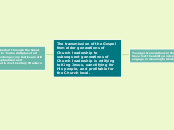The transmission of the Gospel from elder generations of Church leadership to subsequent generations of Church leadership is edifying to King Jesus, sanctifying for His people, and profitable for the Church local.
Jesus commanded through the Great Commission to "make disciples of all nations." Contemporary tactics are still being conceptualized and implemented in 21st Century Western Context.
The 2016 election revealed the fractured nature of American church along political lines.
The loss of cultural or nominal Christianity has revealed the fruit of much of the discipleship of the 20th century to be more shallow than previously thought.
There is more confusion now about what it means to be a Christian and the core of the Gospel.
"None's on the Rise" and other significant research about Mosaics and Gen Z.
Subtopic
The majority Church has not fully grasped or embraced the cultural context it finds itself trying to serve with the Gospel.
Racial diversity in America continues to grow. The Church has not embraced the multi-ethnic Kingdom presented in the eschatological vision presented in the Scriptures.
The Digital Age has provided novel opportunities and challenges for discipleship.
Younger Generations in the Church have lost the ability and space to engage in meaningful dialogue.
Possible Solutions
Create spaces within the church which are intended to recapture the essence of discipleship (i.e., multiplying disciples from one generation to the next)
Spaces "outside the church" - creating spaces which are not a "normal" part of the church, intended to facilitate dialogue between generations of church leadership (Busters, Gen X, Mosaics, Gen Z).
Brainstorm innovative ideas for entrepreneurial ministry
Communicate best-practices for reaching those within the "in-group"
Develop empathy and understanding for those across the generational gap
Barriers to creating spaces within the church:
Institutional momentum preventing significant change
Internal pressure to "keep doing what we're doing"
Uncertain about steps for moving forward
Lack of vision for generational discipleship
Lack of perceived need
Reasons why?
The Church in the West has developed a discipleship problem, putting the Church in a minority position in American culture for the first time since its birth as a nation.
Significant shift to post-modern rejection of "Truth" has crept into the church, biasing younger generations away from Christendom models of Church.
Religious pluralism has crept into the worldviews of Mosaics and Gen Z.
Post-modernism is still a newer ideological foundation, and people in the the West are still developing tools to navigate a post-modern culture.
Less cultural training for younger generations to engage in any type of dialogue.

